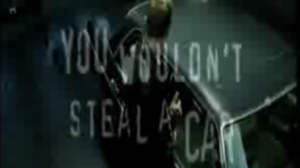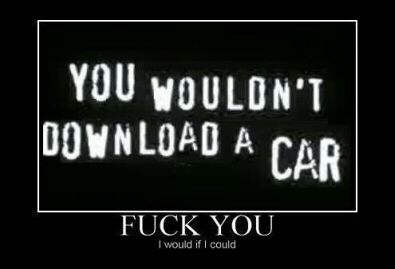I'm going to break my flow of whimsical sarcasm to semi-rant about a subject that's being largely mis-understood at the moment. Illegal file-sharing. I can't (read: won't) condone an action that is illegal, but some people are speaking very loudly in the media lately, with a viewpoint that is, frankly, invalid. Namely that illegally downloading an album is the like-for-like equivalent of walking into HMV, slipping the CD into your rucksack and sprinting out past the alarms. It's not. I'm going to start with the lovely advert that adorns the start of a lot of DVDs at the moment, spelling out the law to people who've already paid for a product, because they already understand that illegal filesharing is... well, illegal. It seems strangely ironic that these messages aren't built into movies themselves, and therefore never show up on the "pirate" copies they're berating. Anyway, their first point:

• You wouldn't steal a car
You're right, I wouldn't steal a car. They're massive and difficult to slip inside your jacket. I'd have to:
• Find a car that I liked
• Make sure it's unsecured (or find a way of bypassing the security)
• Take the car without anyone else seeing me
• Hide the car once I've taken it, because:
• The theft of the car will be reported to the authorities
• Make suitable changes to the car for my continued use, OR
• Sell the car on to someone who can make the changes
But apart from the first step, none of the above points apply to file sharing. An album available on a P2P network isn't secured against theft, it's actually offered for download. Unless a policeman's looking over my shoulder, no-one's going to "see" me taking it. Once I've downloaded it, I don't have to 'hide' the files (or even the burnt CD), because MP3s and copied CDs aren't unusual (or even illegal). The downloading of the album won't be reported to the authorities because a) it was available for downloading, and b) me downloading the files doesn't deprive the original owner of them. I don't have to make any changes to the files I've downloaded (mainly because it's pointless sharing DRM'd tracks), consequentally I can burn/listen/rip the tracks as I wish after that.
But what are the reasons I'd steal a car?
• I'd want to take the car without having to pay for one
That's the main reason. Any secondary reasons will also have that one as a back-up. What are the knock-on effects of me stealing the car?
• I have a car I didn't pay for
• The original owner doesn't have a car
• They then have to make an insurance claim and/or pay for a new one
• The car manufacturers/dealers don't care, because they'll ultimately get to sell another car
Again, apart from the first point there, none of these points apply to file-sharing. Ultimately, the only parties being deprived in the situation are the artist and the record company. Kind of.
It's been said that the record industry is in decline because of file sharing (despite in recent years, bands like Keane and Snow Patrol pushing CD sales to their highest for years). I may be mistaken here, but isn't the car industry also in decline? Factories are closing down in this country and worldwide, workers are being laid off and forced to take extended leave all because car-sales have slumped. Is that because of car-theft? No, it's because there's a global recession on, affecting the sales of essential and non-essential goods alike. If people haven't got money to buy cars to get to work; if people are being laid off from their jobs because banks are collapsing and businesses are going under; if people are struggling to pay their mortgate/rent and put food on the table, they don't have money to buy all the shiny new CDs they'd like. It's that simple.
Of course it doesn't make file-sharing "right", either morally or legally, but that's how things happen. The world isn't "right". Should we have to put up with it? No. Then again, we shouldn't have to put up with car-theft, murder or child abuse either. Okay, that's a little over-dramatic, but the point still stands.
+++

• You wouldn't steal a CD
Again, you're absolutely right, I wouldn't. Apart from having to run away from a security guard built like a brick shithouse, I'd encounter many of the same problems as stealing a car: countering security, not being able to go back in that store again, being caught on the store's CCTV, having a bag full of 'hot' CDs in the middle of town. The smackheads you see on TV documentaries are fucking stupid. At least they have drugs to cloud their reasoning? But for those that do, what are the knock-on effects of stealing a CD?
• I have a CD I didn't pay for
• The store no longer has that CD to sell, denying them staff/store costs and profit
• The store has also lost money on the CD they bought, losing them money on stock-costs
• The record company doesn't care, because HMV's insurance will cover their loss. This will be passed on to the customer in higher prices, and the record company gets to sell the store more CDs. It's not the record company's job to police HMV.
So, as with the car-scenario, apart from the first step, none of the points apply to file-sharing. As harsh as it sounds, HMV aren't "losing" money by people illegally downloading, they're just not "making" money. The same goes for the artists and labels.
+++
So (to me at least), that's the difference many people aren't grasping here. The one between "losing" money and "not making" money. Rail companies lose money every year by people riding on trains without buying tickets. They hide in the toilets and jump security barriers. They're getting a ride at the rail company's expense. That's stealing. What if people decide to take the bus instead of the train? Are the train company still losing money? They're not getting the revenue that they would be if John had gone into London on the train! But it's okay, John paid the bus company instead. But what if John doesn't want to pay the money to get into London? What if he asks Tom for a lift, and his Tom says yes? He's got into London and hasn't paid, and yet Tom has ended up paying to drive into London (as he was going to anyway). Tom said it was okay and allowed John to share what he'd paid for.
Of course, that only applies to the borrowing of CDs (which the record companies used to moan about before file sharing). The key thing with file-sharing is the sheer size of the networks. You no longer have to know someone who has the album you want, there are many strangers who have it and are willing to share it for nothing. It's the digital equivalent of John hitch-hiking to London. He's travelling essentially the same route, he can see the train tracks that the rail company's paid money to put down, and he's seeing the same sights along the way. The ride may take longer, he's not guaranteed a luxurious journey, but he gets there in the end.
So would the rail company be justified in saying they're "losing money" because of hitch-hikers? Of course they fucking wouldn't. That'd be ridiculous. Although, what if there were a lot of hitch-hikers? More than ever? An increasing number of people prepared to take the slow, precarious, free (and in some places, illegal) route into London instead of paying the train company? I'm sure they'd mention it at the next board meeting, when the line is plummeting down the graph. The managing director could rant and moan all he wants, but sooner or later he'd have to ask "Why? Why are people really prepared to take this inconvenient route when we're offering the service at a premium? Shortly thereafter, he'd do well to ask himself if his service is really value for money? And what he could do to improve it?
+++
Let's say, hypothetically, that John (A different John. Doesn't matter, he's hypothetical remember?) illegally downloads ten albums a week. Some he likes and he keeps, some he doesn't like and he deletes after listening to. Some, occasionally, he even likes so much that he goes out and buys the original, but only if it's got a bonus DVD. Often he'll buy them at a later date when they're in the sale for £5-6.
Hypothetical Records finds out about this and decides to sue John for loss of earnings. "Over the last year, that's 520 albums he's had out of us", they claim.
"That's one way of looking at it", his defence says. "But if it weren't for the downloading, would you expect John to have paid for 520 albums in a year?"
It's not very likely, is it? I don't know anyone that buys one CD every week, never mind ten. And it's a common consumer practice for people to wait and buy 'premium' goods in the sale. The stores have enough sales and promos to know this. John downloaded ten albums a week because he could. Because they were there. Because they were "free". He then carried on buying CDs at his normal rate. He probably even got into some new music along the way, that he wouldn't have heard otherwise.
Does this justify John's actions? Of course it fucking doesn't John broke the law and he knows it. Only an idiot believes that the free album they're downloading via P2P is above-board.
So what to do? Ban file-sharing software? That'd be like banning all cars because some are used in robberies. Cut file-sharers off the internet? That'd be like the bus company refusing to take someone into town because they've been caught shoplifting there. Ban the internet? Lord knows it's been used for a lot of morally dubious things since it's inception.
Or maybe, just maybe... the people complaining the loudest over this could take a look at the products and services they're offering and think "If it's worth stealing, it's got to be worth paying for. So something's got to give..."
+++
As a last note, I should point out that the film/cinema industry is going through exactly the same thing. At our local cinema it's £7 for an adult ticket, £5 for a child's one. Drinks are £2-£3.50, and the shitty food is equally inflated. Then they wonder why the family don't come down at the weekend to watch Monsters Vs Aliens? It's not because of the bootleggers (although they don't help). It's because in three months time they'll be able to pay £13 and watch it in the house. At great quality. As many times as they like. Three months after that, it'll be on sale for £8. Within a year, you'll be able to buy it for £4. That's why cinema attendances are down. After years of patronising viewers with "piracy is evil" adverts (again, ironically being shown to people who've paid to sit there), they've finally come up with a more effective message:
• The qulity of cam-jobs is shit
• And thank you for paying to be here.
...It's not rocket-science, people.

DISCLAIMERS:
• ^^^ That's dry, British humour, and most likely sarcasm or facetiousness.
• This is a personal blog. The views and opinions expressed here represent my own thoughts (at the time of writing) and not those of the people, institutions or organizations that I may or may not be related with unless stated explicitly.

No comments:
Post a Comment